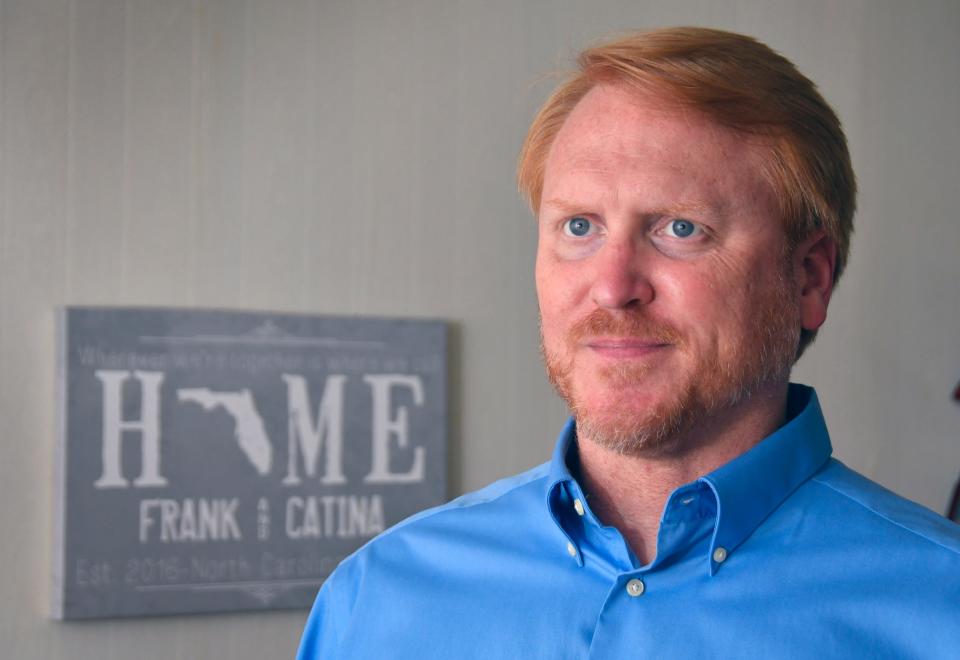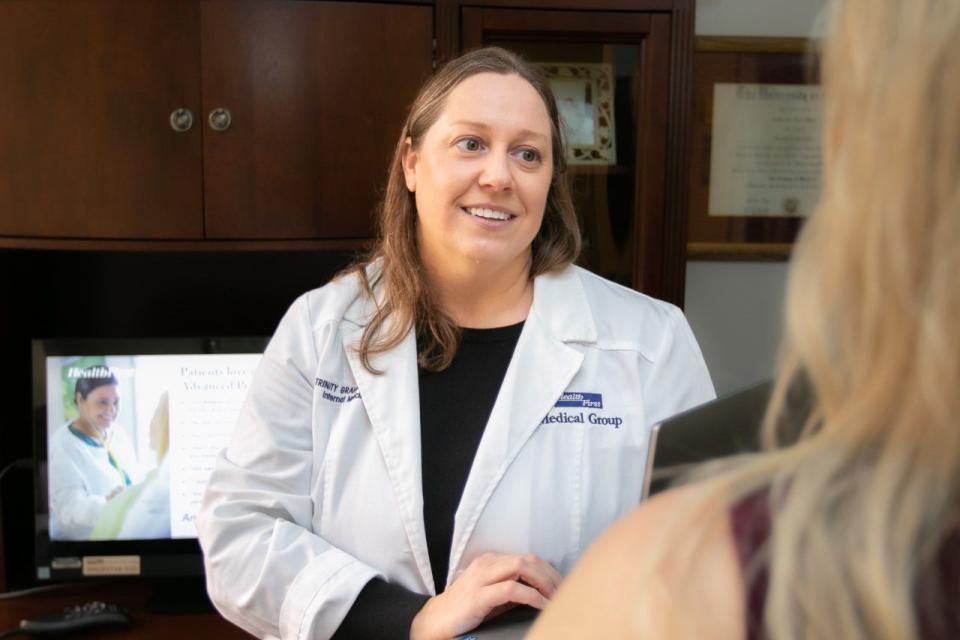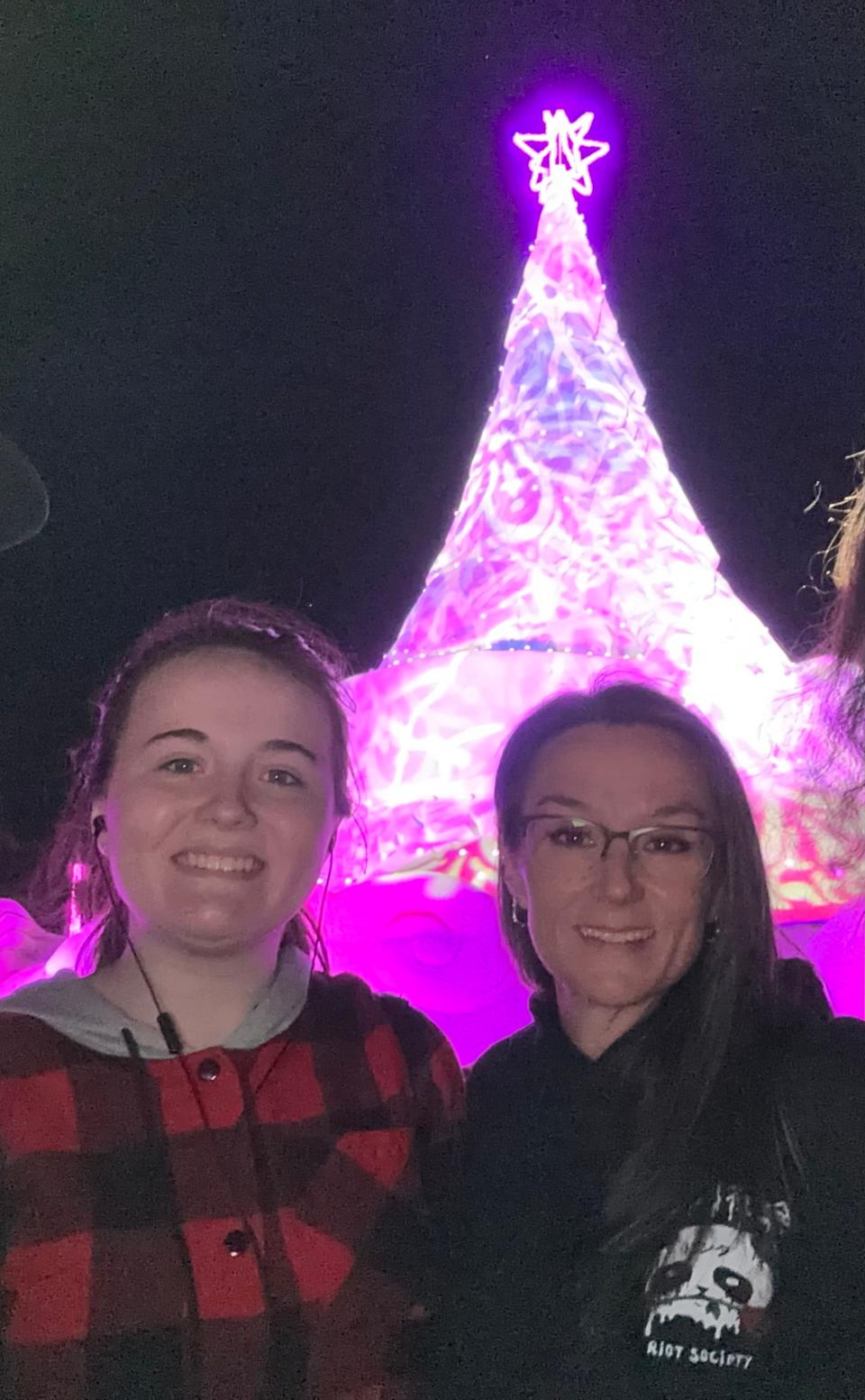"I'm not crazy:" Health First program aims to help treat long COVID patients
- Oops!Something went wrong.Please try again later.
Titusville resident Frank Davidson contracted COVID-19 twice, in August 2021 and July 2022. At first, the 51-year-old insurance adjuster thought his second bout with COVID was easier, but later found that he was mistaken, and "everything went downhill after that."
Depression. Memory loss. Brain fog. Fatigue and gastrointestinal issues plagued him, ultimately affecting his work performance.
It turns out that Davidson was among the estimated 10% to 30% of COVID-19 patients to experience what's known as "long COVID" or "chronic COVID," with lingering symptoms that can last for months or even years.

"I kind of felt like things were falling apart," Davidson said. "There were a bunch of warning lights just going off with things that seemed totally unrelated."
Davidson, a former Army sergeant, was discouraged, as he considered himself a high-performer who was driven to excel at work. The combination of symptoms forced Davidson to temporarily stop working in October.
He didn't really connect the dots and realize all his symptoms stemmed from the coronavirus he'd had months earlier until after he'd enrolled in a special post-COVID-19 care program at Health First last fall.
The Health First long-COVID program began in January 2022. At the time it started, the program was one of the first comprehensive post-COVID programs of its kind in the state.
No longer global emergency: COVID hospitalizations are down in Florida but viral loads are up in parts of the state
It initially was a pilot program open only to patients with referrals from a Health First Medical Group primary-care physician, according to registered nurse Stephanie Rowlett, who is a nurse navigator, helping guide patients through the program. In October, the program was opened up for referrals from outside physicians not connected with Health First or by the patients themselves.
Davidson credits the program with helping him, saying he's now up to about 80% to 85% of his pre-COVID condition, "and it's getting better daily."
The Health First long-COVID program uses a dedicated nurse navigator and nurse practitioner, along with primary-care physicians and specialists, to develop a customized care plan for each patient. That means getting the patient appropriate diagnostic tests, referrals to specialists and any needed therapies, while ruling out underlying medical conditions that may be causing the symptoms. The team stays in contact with the patient’s primary physician.
Long-COVID program's origins at Health First
"It's started to become clear about a year or so ago that long COVID was a real serious concern," said Dr. Mark Rosenbloom, Health First's vice president of clinical transformation, who works with teams at Health First to create new programs, including the post-COVID-19 care program. "More and more patients were developing a series of unusual symptoms."
Rosenbloom said long COVID is "such a vague and diffuse and amorphous condition with so many different symptoms" that Health First wanted to create a program in which patients had the feeling that "we hear you, we believe you" ― reassuring them that their symptoms are real.
"This looked to be a need that we wanted to fill," Rosenbloom said.
Alternative to hospital stay: Healing at home: Health First program offers 'hospital-level care' option for patients
Rowlett said for many of the patients, being heard was so important.
"A lot of these people have not really had the validation of their symptoms prior to being referred to our program, so when they have that opportunity to discuss it with somebody who understands what they're going through, they kind of take that ball and run with it, and it gives us the opportunity to really allowed them to talk fully and openly," Rowlett said.
35 potential long COVID symptoms
John Eiler, Health First's system vice president for behavioral services, said there are about 35 different symptoms that can accompany long COVID.
Among the most common are fatigue; "brain fog," including loss of concentration and memory issues; respiratory problems, including shortness of breath; loss of sense of smell or taste; anxiety; and depression, according to Eiler, who helped design the program and helps coordinate mental health services for patients in the program. Many long-COVID patients also experience chronic pain and loss of appetite.
Trinity Graham, an advanced practice registered nurse working in the program, noted that "everyone has their own constellation of symptoms," with two to six typically among the largest concerns.
First Flight's role: Behind the scenes: First Flight helicopter crew saves lives during Space Coast emergencies
Eiler also considers as a symptom the fact that "the patients, in most cases, have never really been heard about their symptoms lingering on," and that a physician or family members "are simply not giving credibility to the patient's concerns."
Rowlett said when, for example, family members or coworkers don't believe the COVID patient has has lingering symptoms, "it's quite devastating to them."
Many people with long COVID "look well, and they're able to kind of put on a front to maybe push through a little bit and get through, so people that they know casually maybe don't understand what they're going through," Graham said.
How to handle fatigue in long COVID
Rowlett said some patients have such profound fatigue that they might take days to recover after doing what previously were routine tasks.
"When the fatigue is not well-managed, it can make every other symptom that they experience much worse," Graham said, so the patients are coached on lifestyle adjustments.
Rather than the common belief that the patients should get up and go on a walk or partake in some other exercise, "that's exact opposite of what we're telling them," Rowlett said. "You have to allow yourself time to regenerate, and not only just bringing the physical activity aspect of it, but the mental and the emotional activity aspects."
That may also include avoiding any chaos created by a family member in a home environment that is contributing to the patient's extreme fatigue.
New head of Health Department: County Commissioner Zonka selected to be Brevard's health administrator
"It's really kind of learning and talking to them and pinpointing what it could be that is really contributing, and trying to eliminate that aspect, so that they can they can rejuvenate and repower," Rowlett said.
How Health First long-COVID program works
"Health care sometimes can be very frustrating, and having somebody guide you through difficult times, it is a big plus," Dr. Mario Ruberte, an internal medicine physician who is the lead program physician in Health First's long-COVID program. "So I think that, for now, we're making a big change and, that's really priceless."
First, an initial intake interview is done with the patient, which can last an hour or more, and can be done either in person or virtually.

The next step it to review the screenings, including for depression, anxiety and cognitive function, along with the ability to carry out activities of daily living. There also is a review the patient's symptoms, including "comparing and contrasting life for them before and after an initial COVID infection," Graham said, as a way to help determine what the focus needs to be, including what the patient's primary symptoms and concerns are.
"And then, from there, we really start to look at what type of testing might have been completed. Have we ruled out any other medical conditions that may be contributing to this?" Graham said. "In most cases, we find that lots of testing has been done, but there are no really solid answers."
"Then, from there, we're able to work with them on symptom management, and really focusing on improving quality of life," Graham said.
As part of the process, the patient completes any necessary evaluations and testing, and works with their primary-care provider to develop a customized plan. Sometimes, specialists are involved.
"The idea is that we work in concert with other providers already involved with the patient, but we can really hone in and focus on those specific symptoms, and take some of the work off of the referring provider in those cases," Graham said.
Davidson said, for him, the program helped tie all his post-COVID symptoms together.
"What didn't seem to make any sense at all now started making sense," Davidson said, with a plan of therapy and medication that allowed him to return to work and "get me to trying to be a happy person" again.
"Without that focus on one diagnosis, we'd have been chasing rabbits for a year," Davidson said.
'I'm not crazy:' long-COVID patient says
Shannon Romero of Port St. Lucie is among the long-COVID patients enrolled in the Health First program. She had COVID in January 2022, and has dealt with various symptoms ever since, including brain fog, memory loss, gastrointestinal issues, loss of sense of smell, unusual weight loss, headaches, fatigue and anxiety.

"I feel like I've aged 10 years in one year," Romero said. "It's just frustrating, because you don't feel like the person you were."
Romero, 49, who had lived in Titusville when she contracted COVID and move to Port St. Lucie in October, says many of the physical symptoms have remained, but she has received benefits from the Health First program.
"The biggest thing is feeling I'm not crazy," Romero said. "I'm tired for a reason. I know what makes the symptoms worse and what makes it better."
Romero said, before joining the program, sometimes, she would walk into a doctor's office, "and they say 'you're fine,'" when she knew she wasn't.
In contrast, when she talks with nurses coordinating the Health First long-COVID program, Romero said, she feels comfortable that they are listening, saying it's "like your talking to your mother your sister or your best friend," plus "they're only a text away" if Romero has a concern.
While Romero estimates that she is only about 15% to 20% recovered from the physical symptoms, she says, emotionally and mentally, she feels like she is 70% to 80% recovered.
Hard to track numbers of long-COVID cases
So far, the program has treated 228 patients. The patients currently in the program have an average age of 50, and range in age from under 30 to over 80.
But that's likely only a small fraction of the local residents who have experienced long COVID, medical providers say.
Graham said anywhere from 10% to 30% of COVID patients subsequently experience symptoms of long COVID, which the Centers for Disease Control and Prevention defines as symptoms lasting more than four weeks. The symptoms, though, can last months or longer.
The percentage is significantly higher — from 50% to 70% ― among patients who had acute COVID that required hospitalization, including those admitted to an intensive-care unit.
Since March 2020, there have been 175,580 confirmed COVID-19 cases in Brevard County, according to the latest Florida Department of Health data. However, total number of cases in Brevard probably is much higher, because many cases go unreported due to self tests for the virus and others who were not aware they had COVID-19.
Using Department of Health data and a conservative estimate of 10% of COVID-19 patients also experiencing long COVID, that would mean there have been more than 17,000 long-COVID cases in Brevard.
Eiler said putting a handle on the total number of long-COVID cases remains difficult to track, because there wasn't even a formal medical diagnosis code for it until last October.
Rosenbloom added that there also is no single test to diagnose post-COVID conditions.
"Anyone who has been infected with the virus that causes COVID-19 can experience post-COVID conditions ― even people who’ve had mild illness or no symptoms at all," Rosenbloom said.
Rowlett said Health First staff has found that, generally, the sooner people seek treatment after realizing they may have long-COVID symptoms, the quicker their recovery turnaround is after joining the program.
"The patients who have been suffering for over two years are really the most challenging ones, because it's been so long," Rowlett said. "We don't want to further complicate things for them and make it drag it out even even longer, because it has been so life-altering."
Ruberte ― who also is a director of primary care for Health First Medical Group ― emphasized that, in general, there also are no quick fixes when it comes to long COVID.
"This is not a sprint run," Ruberte said, "It is mostly a marathon. And things change on the course and the condition changes."
For more information
Health First is advising people who think they may be experiencing symptoms associated with long COVID to consult with their medical provider. If appropriate, the provider can refer the patient to Health First's post-COVID-19 care program.
Contact Berman at dberman@floridatoday.com, on Twitter at @bydaveberman and on Facebook at www.facebook.com/dave.berman.54.
.
This article originally appeared on Florida Today: Health First program focuses on Brevard long-COVID patients

